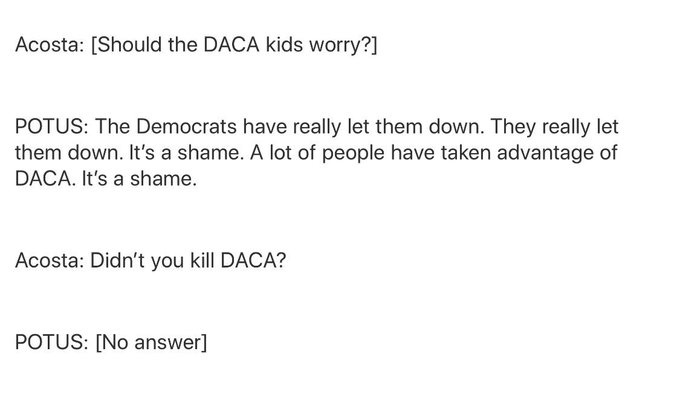The following article by Amber Phillips was posted on the Washington Post website April 2, 2018:
President Trump appears to be realizing what the rest of Washington has already come to terms with: A deal to protect “dreamers” from deportation is dead.
Recognizing that hundreds of thousands of sympathetic young immigrants could be deported under his watch, he’s on a tear to blame Democrats for a deal’s falling through. Trump has declared the deal dead and then blamed Democrats for it at least three times in the past 24 hours.
But so far, that argument doesn’t seemed to have swayed a measurable number of Americans. A majority of Americans think the 2012 Obama-era program protecting immigrants brought to the country as children from deportation should be continued. And a majority of Americans blame Trump and his party for ending it.
The past few months give us a pretty good indication as to why Trump’s losing the “blame the other side for ending DACA” public opinion battle. Three things in particular:
1. The most obvious is that Trump ended DACA. In September, under a threat of a lawsuit from conservative states, he decided to end the dreamer program. He set a deadline for deportations to start in early March and tossed it to Congress to decide what to do, not really making clear in the process what he wanted to see happen with dreamers.
Several court cases alleging that Trump illegally ended DACA have made the March deadline moot, meaning dreamers already in DACA can renew their applications. But Trump has yet to come up with a solid explanation for why the other side deserves the blame when he’s the one who ended the program.
He dodged a reporter’s question asking exactly that Monday at the White House Easter Egg Roll, although it’s also possible he didn’t hear it.
2. Trump hasn’t proved to be a reliable negotiator on dreamers. He has contradicted himself and his party’s leaders so many times on immigration that they’ve basically stopped taking his statements at face value. “We don’t have a reliable partner at the White House to negotiate with,” Sen. Lindsey O. Graham (R-S.C.) said during a January shutdown debate.
After waffling for months on whether Trump even wanted a permanent solution for dreamers, his administration took a hard turn to the right and proposed drastic changes to the legal immigration system in exchange for a path to citizenship for millions of qualified dreamers.
Not even most Republicans in Congress support that idea. But Trump settled on this and refused to negotiate beyond this proposal. So in the budget deal Congress finally signed and sent to Trump’s desk last week, there was no deal for dreamers, not a lot of money for his border wall and no changes to the legal immigration system.
It’s harder to measure whether voters lump in Trump’s unreliable negotiating style when considering whom to blame for the end of DACA. But we have an ancillary way to look at that: whether voters blamed him for the January government shutdown, which was largely fought over DACA.
A Washington Post-ABC News poll released just before the shutdown found that a majority of Americans would blame Trump and Republicans for it, by a 20-point margin.
A Washington Post-ABC News poll after the shutdown found that the number held after the shutdown.
3. Trump’s rhetoric on immigration doesn’t match what he’s saying now: In his opening campaign speech, Trump literally accused Mexican immigrants of being criminals and rapists. His winning campaign theme was to build a wall along the U.S.-Mexico border to keep immigrants out. A year into his presidency, he asked, using a profane term, why people from such countries such as Haiti and African nations had to come to the United States under a bipartisan immigration deal lawmakers presented him. It was a comment that ultimately scuttled any deal.
Trump has occasionally said he is sympathetic toward dreamers and wants to protect them from deportation. But that’s hard to square for anyone listening to what else he says and does about it, especially when it comes to protecting dreamers.
View the post here.




